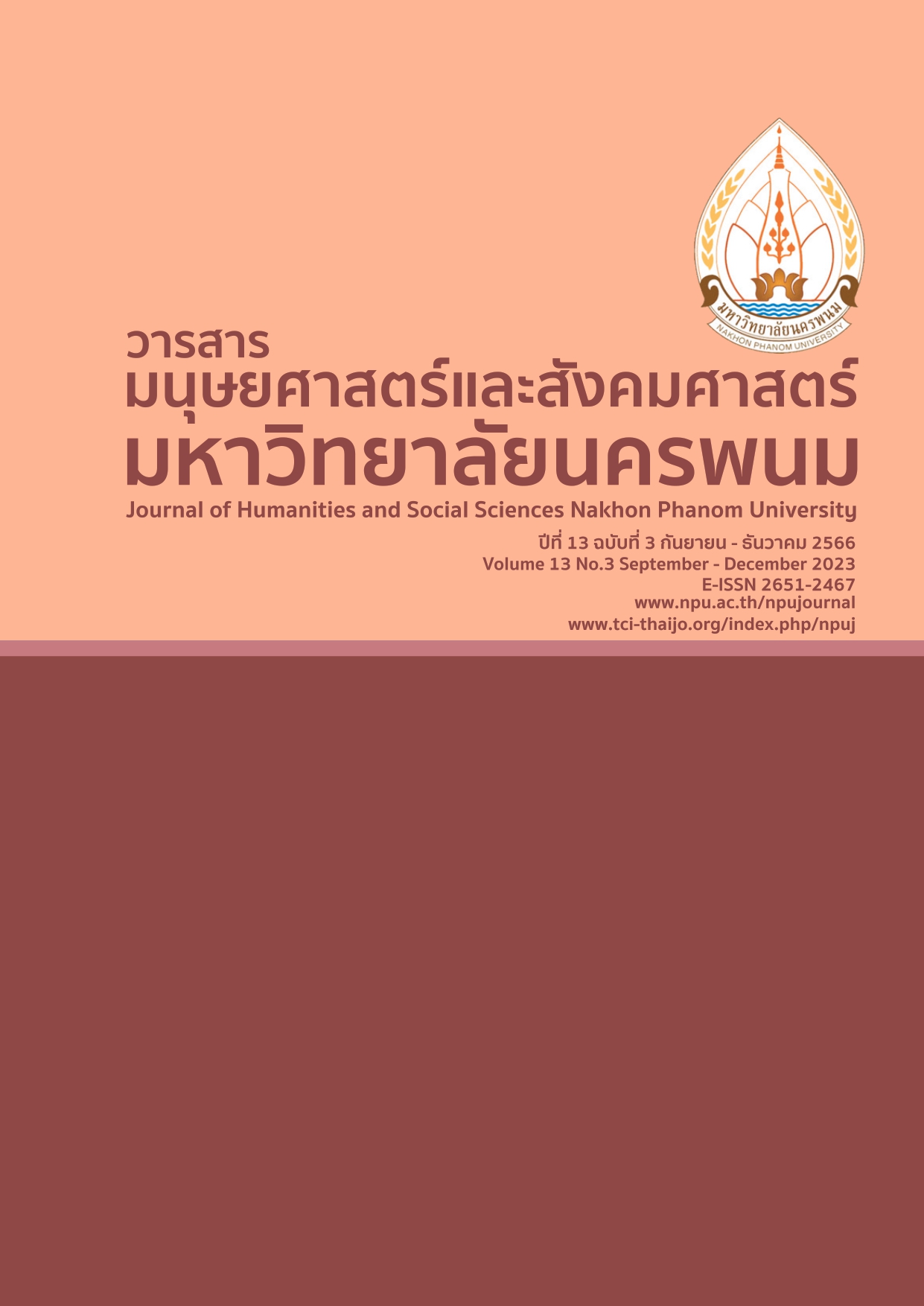Development of Scientific Literacy of Mathayomsuksa 3 Students on the Topic of Daily Materials Using Inquiry Model (5E) Combined with TPACK
Main Article Content
Abstract
The purposes of this research were to create learning management plans of inquiry model (5E) combined with technological pedagogical content knowledge (TPACK) for Mathayomsuksa 3 students on the topic of daily materials to meet the 75/75 efficiency criteria, compare the scientific literacy and learning achievement of before and after the learning management, and study the students’ satisfaction. The samples of this research were 22 Mathayomsuksa 3/3 which used a cluster random sampling using classroom as a random unit. The research tools were inquiry model (5E) combined with TPACK learning management plans, a scientific literacy test, a learning achievement test, and a satisfaction questionnaire. The statistics used for data analysis were percentage, mean, standard deviation, and t -test for Dependent Samples. The findings found that the efficiency of learning management plans was at 76.50/76.59 which was consistent with 75/75 the criteria. The student’s scientific literacy after learning was significantly higher than before at .01 level. The learning achievement of the students after learning was significantly higher than before at .01 level. The satisfaction of the students was at the high level (= 4.28).
Article Details

This work is licensed under a Creative Commons Attribution-NonCommercial-NoDerivatives 4.0 International License.
References
Awae, P., Chomchuen, A. and Sama-ae, A. (2018). Effects of Learning Management by Concept Attainment Process on Concept of and Achievement in Mathematics. Kasem bundit journal. 19(2), 108-124.
Bumrungpun, W. and Yuenyong, Y. (2021). Enhancing Phathomsuksa 5 Students’ Science Learning Achievement and Analytical Thinking Skill Using Inquiry-based Learning Approach (5Es) and Concept Mapping Technique. Journal of Humanities and Social Sciences Review, 23(2), 186-207.
Bumrungudomrat, P. and Wutchana, U. (2021). The 5E of Inquiry-based Learning Incorporating Online Classroom Using Google Sites in term of Chemical Equilibrium of Grade 11 Student. neu academic and research journal. 11(1), 260-274
Bureau of Educational Testing. (2019). PISA CENTER, OBEC. Retrieved December 2020, from https://www.pisacenterobec.org/about-me/
Chanapimuk, K., Sawangmek, S. and Nangngam, P. (2020). Promoting Scientific Literacy by Using Science, Technology, Society, and Environment (STSE) Approach of Grade 11 Students on the Topic of Plant Growth. Journal of Education Naresuan University. 22(2),62-73.
Chularut, P. (2018). Learning Management for Students in the Thailand 4.0 Era. Veridian E-journal Silpakorn University. 11(2),2363-2380.
Chum-ongwa, K., Wongchalee, P. and Suwannatrai, K. (2020). Comparison of Science Process Skills and Learning Achievement of Grade 9 Students on the Topic of Life and Environment and Natural Resources by Using the Principles of Sufficiency Economy and Conventional methods. Journal of Roi Et Rajabhat University. 14(1),15-26.
Hasamoh, Y. (2019). Effects Of Inquiry Based Learning And Augmented Reality On Development of Scientific Concept In Human Circulatory System for Grade ElevenStudents Unpublish master’s thesis. Thaksin University, Songkhla, Thailand
IPST. (2021). PISA 2018 Assessment Results Reading, Mathematics and Science. Bangkok: Institute for the Promotion of Teaching Science and Technology.
Krostsalee, P., Pansuppawat, T. and Khamhaengpol, A. (2020). Development of Creative Thinking for Grade 6 Students on the Topic of Daily Life Chemicals by Using Stem Education and Graphic Organizers. Journal of Roi Et Rajabhat University. 14(1), 196-209.
OBEC. (2019). Guidelines for development of basic education learner competency. Bangkok: Office of the Basic Education Commission.
Office of the Education Council (2019). Active Learning. Bangkok: 21 Century co., ltd.
Phuaphan, N. (2019). Development of an Innovative Methods Course Supporting Preservice Science Teachers’ Technological Pedagogical and Content Knowledge : a critical participatory action research Unpublish Doctoral’s thesis. Naresuan University, Phitsanulok, Thailand
Prommanee, P., Pitayavatanachai, Y. and Tappha, J. (2020). Concepts of Satisfaction and Construction of Job Satisfaction Questionnaire. Apheit journal. 26(1), 59–66.
Saelow, W., Yuangsoi, P. and Roungrong, P. (2022). The Development of TPACK Model Online Instruction to Promote Team Work for Undergraduate Students. STOU Education Journal, 15(2), 102-116.
Songsak, P. (2018). The Development of Research Clinic System, Faculty of Education Mahasarakham University]. Social Sciences Research and Academic Journal. 13(38), 59-74.
Srisa–ard, B. (2010). Introduction to Research. Bangkok: Suweerivasarn company limited.
Suwansil, P. (2023). The Development of Learning Achievement Through Learning Unit of Processes Change Inside the Earth of Grade 12nd Students by Learning from Creating Infographics. Journal of Legal Entity Management and Local Innovation. 9(1), 151-162.
Tamtrakul, P. and Bongkotphet, T. (2022). Developing Scientific Literacy through Context-based Learning with Technology involving Acid-Base Topics for 11th Grade Students. Journal of Humanities and Social Sciences Nakhon Phanom University. 12(1), 291-305.
Thepbamrung, N. and Aumgri, C. (2018). A Learning Management of TPACK MODEL Using 3D Augmented Reality In Science Subject For Grade 7 Students Case Study in Bantonksadao. Journal of Applied Information Technology. 2(1), 29–35.
Tuntavanitch P. and Jindasri. P (2018). The Real Meaning of IOC. Journal of Educational Measurement Mahasarakham University. 24(2), 3-12.
Yodtep, S. (2019). The Development of Learning Achievement and Scientific Attitudes for the Pratomsuksa VI Students by Using 5 Es Inquiry Cycle Unpublish master’s thesis. Hatyai University, Songkhla, Thailand.


